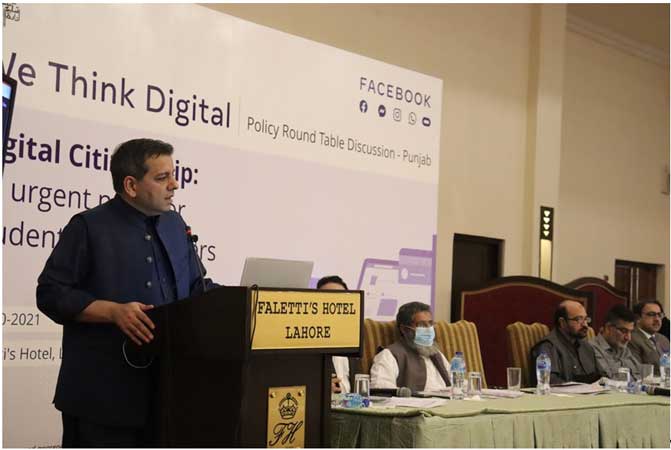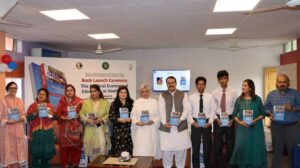Facebook and Idara e Taleem o Aagahi organised its first round table conference titled “Digital Citizenship: an urgent need for students and teachers” recently at Faletti’s Hotel in Lahore. The event saw a brilliant lineup of government officials, educational policy experts, and civil society activists to brainstorm the future of digital citizenship in the country. Punjab Minister for Education Dr Murad Raas attended as the chief guest and chair of the event, presiding over the esteemed panelists Dr Mariam Chughtai, Director National Curriculum Council (NCC); Dr. Amir Riaz, Director Curriculum, Pakistan Curriculum and Textbook Board (PCTB); Dr. WaqarNaeem Qureshi, Director General IT Solutions, Punjab Information Technology Board(PITB); ShahidRehman, Project Director, PMIU; Muhammad Tariq Iqbal from Quaid e Azam Academy for Educational Development Punjab (QAED); and Usama Khilji, Founder Bolo Bhi. The aim of bringing together these talented individuals was to talk about the importance of digital citizenship. With the world still trying to grapple with the Covid-19 pandemic, it has been made clear that all individuals must have robust digital skills to navigate the online world with safety and ease. It is therefore vital to equip our teachers and students on the topics of digital literacy and digital safety and what it means to be a digital citizen. While digital literacy is the knowledge of all the tools available online for a digital citizen and how to use them, digital safety is the ability to identify and protect oneself from online threats. Both these elements are of vital importance for future generations that are being born as digital natives. WeThink Digital Program, has the strategy to train teachers on digital citizenship concepts to build a sustainable knowledge bank of individuals who can directly impart this knowledge to their students. Under this initiative, the team successfully trained 2077 teachers, 60,000+ students from 710 schools, and 13 districts of Pakistan. In Punjab, the ITA master trainers, conducted training sessions with 1,058 teachers who in turn have trained 27,616 students in 345 schools. The sessions cover topics such as digital identity, online reputation, fake news, and data privacy which are of great interest for all as they are integral elements of our daily lives and help navigate our digital footprint. The representative from QAED, Muhammad Tariq Iqbal took great interest in the training material Facebook has developed for its teacher training sessions and invited Facebook to share its resources to improve the quality of teacher training content that QAED has for teachers all over Punjab. Dr Mariam Chughtai, Director National Curriculum Council encouraged the ‘We Think Digital’ team to share their resources with the Single National Curriculum Committee for various relevant subjects so that critical topics of digital citizenship can be included in the draft curriculum and reviewed by educational experts in the near future. In response to the call to action put forward by the We Think Digital Program, Dr. Mariam Chughtai said: “The generation gap is now smaller than ever before. This means that children today are growing up in a world very different from even their older siblings. Any effort to prepare them for the world of tomorrow must put digital literacy at the center of its ethos. The Government of Pakistan through its Single National Curriculum education reform exercise is committed to preparing our young generation to be global citizens. We welcome partnership with organisations such as Facebook in this effort.” The chief guest Murad Raas greatly emphasised the need for the incorporation of digital citizenship knowledge in student education. Regarding this issue, he said “Parents are important stakeholders for the interaction of children with technology but they are still not trained to know what online activity is appropriate or not. So the role of teachers is more important than parents, because the child spends much more time at school than at home. Getting the teachers trained on this is very important.” The minister invited the Facebook leadership and ITA to hold potential one on one talks to take this initiative forward.




